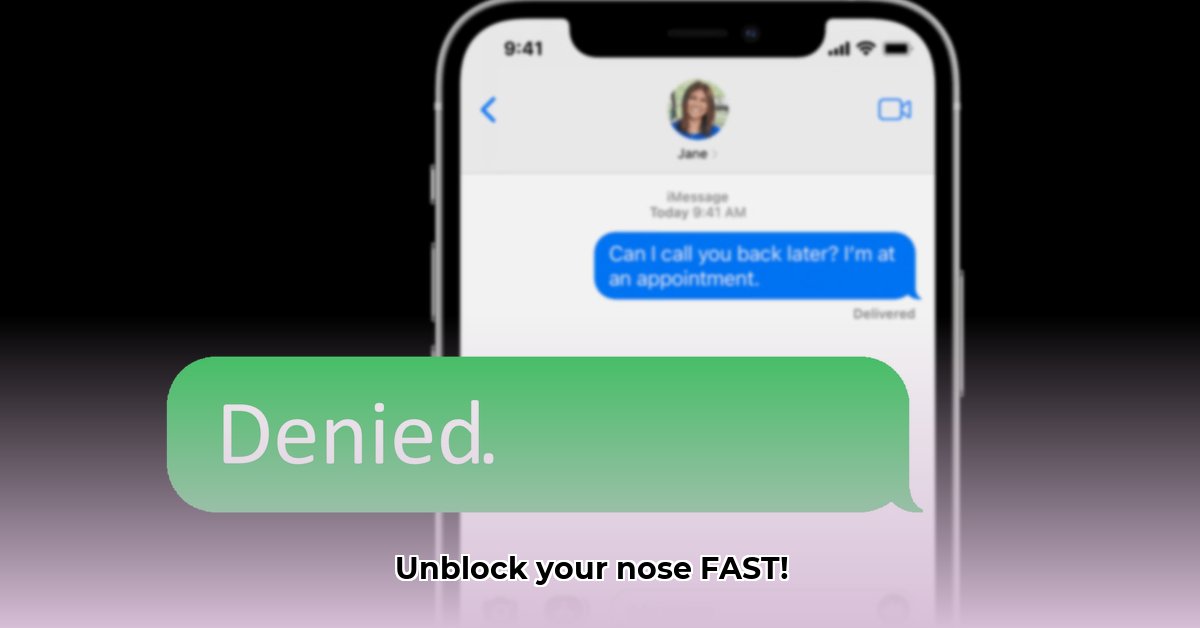
Ai, that blocked nose! It's a real moegoe, isn't it? Makes breathing tough, ruins your sleep, and generally leaves you feeling miserable. But moenie worry nie, you don't have to suffer. This guide shows you quick, effective ways to clear that stuffy nose. We'll cover home remedies, when to see a doctor, and medical solutions. Let's get you breathing freely again!
Understanding the Enemy: Why is My Nose Blocked?
A blocked nose, or nasal congestion (as the doctors say), has many causes. Sometimes it's a common cold, other times allergies, or maybe just dry air. Basically, your nasal passages are swollen and inflamed, making breathing difficult. Lots of mucus doesn't help either!
Quick Fixes: Home Remedies to the Rescue!
Before rushing to the doctor (a good idea if things get serious), try these simple home remedies – often providing almost instant relief.
Steam Inhalation: Boil some water (carefully!), lean over and drape a towel over your head to trap the steam. Adding eucalyptus or peppermint oil helps too. The steam loosens thick mucus.
Nasal Irrigation (Neti Pot): A neti pot (a small jug) gently rinses your nasal passages with saline solution (salt water). This washes away irritants and mucus, providing quick relief. Use sterile water or pre-made saline to avoid infection.
Hydration is Key: Drinking plenty of water thins mucus, making it easier to drain. Herbal teas like chamomile or rooibos are also soothing.
Elevate Your Head: Sleep with your head propped up on extra pillows. Gravity helps drain mucus.
Humidify the Air: A humidifier adds moisture to dry air, especially helpful in winter. Dry air irritates nasal passages, worsening congestion. Isn't it amazing how these simple things can make such a difference? Do you find any of these particularly helpful?
When to See a Doctor
While home remedies often work, see a doctor if your blocked nose lasts over a week, you have a fever, or your mucus is bright green or yellow. These could signal a serious infection needing medical treatment. Don't delay – ignoring it could lead to complications.
Medical Solutions: What Your Doctor Might Suggest
If home remedies fail, your doctor might suggest:
Decongestants (Use Carefully!): These shrink swollen blood vessels in your nose, easing breathing. However, prolonged use can lead to rebound congestion (your nose gets even more blocked when you stop). Always follow instructions carefully. Have you ever experienced rebound congestion?
Nasal Steroid Sprays (Longer-Term Solution): These reduce inflammation, providing longer-lasting relief, especially for allergies or chronic congestion. They're generally safer for longer-term use than decongestants. Studies show a significant reduction in nasal congestion with regular use.
Antihistamines (For Allergies): If allergies are the cause, antihistamines can help. Be aware they can cause drowsiness.
Antibiotics (Only if Necessary): Your doctor might prescribe antibiotics for bacterial infections, but not for viral infections like colds.
Weighing Up the Risks: A Quick Look at Treatment Risks
It's wise to understand potential side effects. The table below provides a summary. Remember, this is a general overview; your doctor can provide more specific information.
| Treatment | Potential Risks/Side Effects | Severity | Likelihood | Overall Risk |
|---|---|---|---|---|
| Over-the-counter Decongestants | High blood pressure, jitters, sleep problems, worse congestion | Moderate | Quite Likely | High |
| Nasal Irrigation | Infection (if not hygienic) | Low | Somewhat Likely | Low |
| Nasal Steroid Sprays | Mild irritation, nosebleeds | Low | Unlikely | Very Low |
| Antihistamines | Drowsiness, dry mouth, dizziness | Low | Somewhat Likely | Low |
Disclaimer: This information is for general knowledge only and isn't professional medical advice. Always consult a doctor for health concerns. Self-treating can be risky.
Easing Little Noses: A Practical Guide for Children
A blocked nose is especially miserable for children. It hinders breathing, eating, and sleeping. Here's how to safely clear those tiny nostrils:
Saline Solution: Your first line of defence. It's gentle, safe for all ages, and loosens mucus. Use a bulb syringe for babies, and older children can blow their noses after using saline spray.
Hydration: Encourage plenty of fluids to thin mucus.
Humidifiers: Add moisture to the air to loosen mucus. Clean regularly to prevent mould.
Honey (For Children Over 1 Year): Half to one teaspoon can soothe coughs. Never give honey to infants under one year old.
Elevation: Prop your child's head up with pillows to aid drainage.
Over-the-Counter (OTC) Medications: Use with Caution: Many cold remedies aren't suitable for young children. Always consult your doctor before giving your child any OTC medicine.
When to See a Doctor: If your child has breathing difficulties, rapid breathing, or a high fever, see a doctor immediately.
Risk Assessment Matrix for OTC Nasal Decongestants for Children
| Decongestant Type | Age Restriction | Risk of Side Effects | Risk of Allergic Reaction | Risk of Interactions |
|---|---|---|---|---|
| Saline Nasal Spray | None | Very Low | Low | Very Low |
| Nasal Decongestant Spray | Usually 6 years+ | Low to Moderate | Low to Moderate | Moderate |
| Oral Decongestants | Age Varies, typically 6+ | Low to Moderate | Low to Moderate | Moderate |
Note: Always consult your child's pediatrician before using any OTC nasal decongestant. This table provides general information and should not replace professional medical advice.